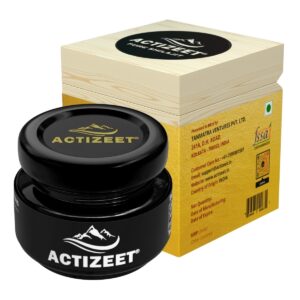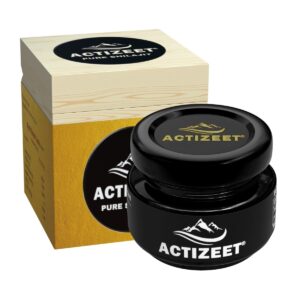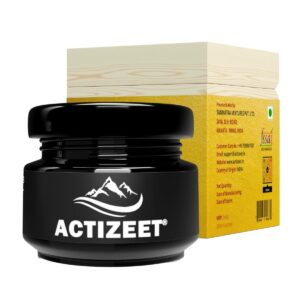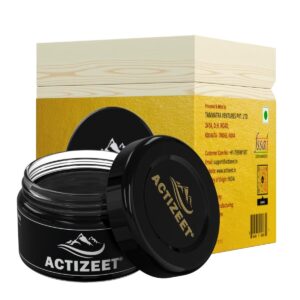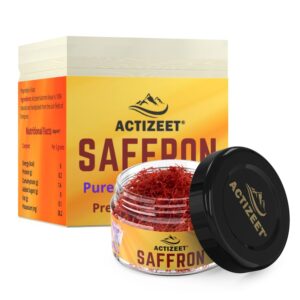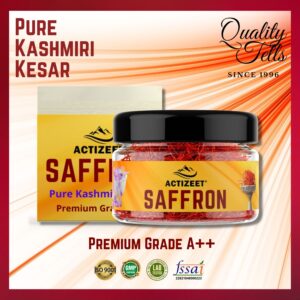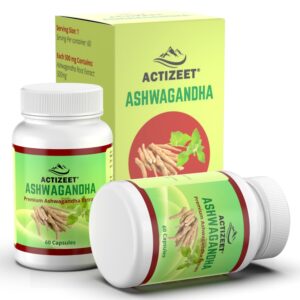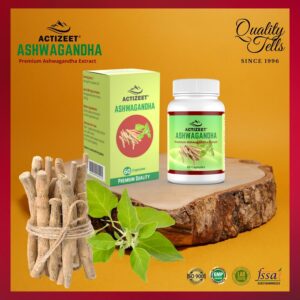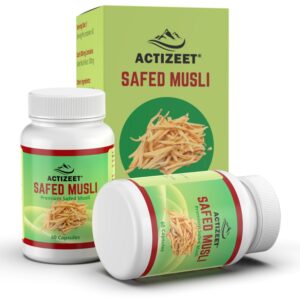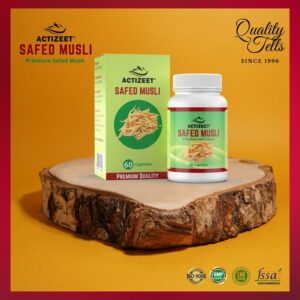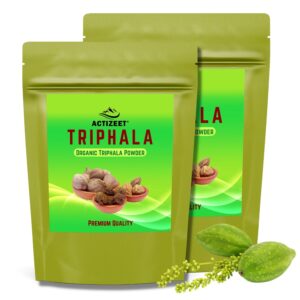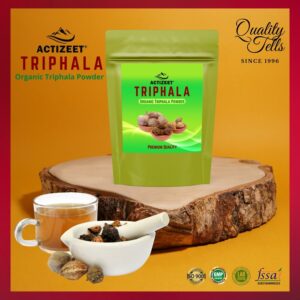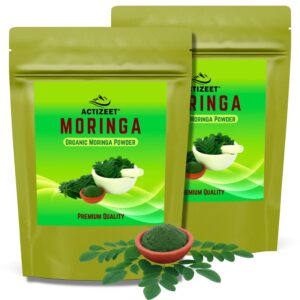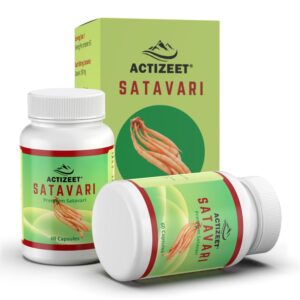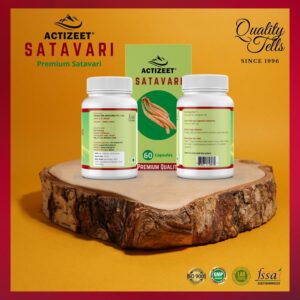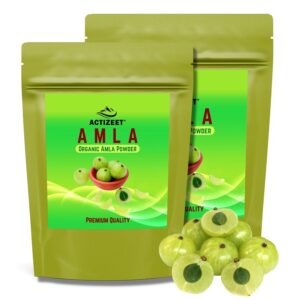Silajit, dubbed the “Destroyer of Weakness” by Ayurvedic practitioners, is one such herbo-mineral or Rasaoushadhi that has remained an important component in the therapeutic process for ages. Silajit, or Asphaltum as it is known in English, has powerful adaptogenic and aphrodisiac properties and is used to treat conditions such as dysuria, mental disorders, skin diseases, urinary disorders, glycosuria, breathing disorders, urinary disorders, kidney stones, edema, phthisis, piles, anemia, epilepsy, and worm infestation. Silajit’s primary role is to control and enhance thyroid gland function.
Table of Contents
ToggleWhat Is Silajit?
Silajit is a remarkable sticky tar-like resinous material that is neither entirely plant nor entirely animal in origin. Shilajit is a sort of mineral pitch found in nature that is composed of humus and decayed plant remnants and is extruded from rocks in the Himalayas at elevations ranging from 1000 to 5000 meters above sea level.
According to ancient Ayurveda texts, the mountains become heated during the summer months of Jeshta and Ashada owing to direct sun rays melting the layers of the mountain and generating a resin-like semisolid liquid material called Shilajatu. However, when the Indian subcontinent crashed with the Asian continent many million years ago, the Himalayan mountains were constructed, crushing and trapping the tropical trees in between the massive stones.
When these components were crushed for millions of years between large layers of rocks, they were transformed into a tar-like sticky material that can be black, brown, or white in color and resembles asphalt. When there is a break in the rock as a result of extreme heat, the material seeps out and settles on the rocks. Shilajit, the secreted herbomineral, is high in minerals and nutrients, as well as bioactive humic and fulvic acid. These can be found in the high ranges of Kashmir, Bhutan, Nepal, Japan, Gilgit, and Tibet.
Common names of Silajit
In English, Shilajit is also known as Asphaltum, Black Bitumen, or Mineral Pitch. Shilajit, Silajat, Shilajatu, Silajatu, Kanmandam, Saileya Shilaja, Moomie, Moomiyo, Punjabinum, Memiya, Shiladhatuja, Adrija, Shilasweda, Shilaniryasa, Asmaja, Asmajatuka, Shilamaya, Girija, Gaireya are some more names for Silajit in Ayurveda.
Silajit Ayurvedic Indications
Ayurveda, the holistic science of traditional medicine, has extensively described the usage of this time-tested substance in numerous ayurvedic texts and journals of Charaka and Susruta.
Silajit is commonly used to treat the following conditions:
Prameha (manages diabetes), Mehahara (treats urinary tract disorders), Rasayani (rejuvenates the entire body), Medhya (improves intelligence), Balya (improves muscle strength), Deepana (enhances stomach fire), Pachana (aids digestion), Rochana (stimulates appetite), Vamana (prevents nausea and vomiting), Shonitasthapana (prevent Shwasha (treats indigestion), Amahara (treats indigestion), Dahahara (relieves burning sensation), Trutahara (relieves excessive thirst), Gulmajit (useful in abdominal tumors), Hikkanigrahana (controls hiccups), Kantya (relieves sore throat), Triptighno (relieves pseudo-satiation), Hridaya (treats heart problems), K (good for nutrition).
Types of Silajit
Shilajit is classified according to the type of mountainous rocks from which it emanates:
Silajit flowing from gold-containing rocks (Charka Samhita Silajit) has a Japa (i.e. Hibiscus flower) or reddish color and contains Madhura, Tikta Rasa, and Katu Vipaka.
Silver-containing rocks (Rajat Silajit): Silajit extracted from these rocks is white in color and has a Katu Rasa and Madhura Vipaka.
Copper-containing rocks (Tamra Shilajit): The exudation from these rocks have a peacock-throat look, i.e. a bluish-purple color, and demonstrates Tikta Rasa and Katu Vipaka.
Iron-containing rocks (Lauha Silajit): Considered the finest kind, the exudation resembles the gum of Guggulu (i.e. Commiphora mukul) and depicts Tikta, Lavana Rasa, and Katu Vipaka.
Chemical Composition of Silajit
This vital mineral compound’s conformation is mostly controlled by factors such as the kind of plant species involved, the geological nature of the rock, and the surrounding temperature, altitude, and humidity of the specific place.
Silajit is typically composed of 50-70 percent organic content, 30-50 percent mineral stuff, and 5% trace elements.
According to various sources and scientific data, it includes around 80 bio-active components such as fatty acids, benzoic acid, hippuric acid, resin, and waxy compounds, albuminoids, gums, and vegetable matter. Shilajit, as a Phyto-complex, is mostly composed of humus compounds such as humins, humic acids, and fulvic acid (50 – 70%). Triterpenes, sterols, ichthyol, ellagic acid, resin, aromatic carboxylic acid, 3, 4-benzocoimiarins, amino acids, phenolic lipids, minerals such as silica, iron, antimony, lithium, manganese, calcium, copper, molybdenum, phosphorus, sodium, zinc, selenium, and trace amounts of dibenzo—pyrones are also present (metabolites derived from plants, fungi, animal faeces or mycobionts).
However, Silajit’s curative and therapeutic benefits are mostly due to the presence of fulvic acid, which aids in the treatment of a wide range of ailments. Also, see the full list of composition
How Can Silajit Be Purified?
When it comes to Silajit, purification, or Sodhana as it is known in Ayurveda, is essential. Although Silajit is a vital mineral in Ayurveda, it can only be utilized after a comprehensive purifying process including multiple herbal tinctures and other chemicals.
The presence of impurities in the form of soil, grime, and so on decreases the mineral’s medicinal and restorative benefits and renders it inappropriate for human consumption. The purification procedure not only eliminates contaminants and germs that may be present in the mineral but also improves the product’s medicinal efficacy. Silajit can be purified in a variety of ways, including utilizing Cow’s Ghee or Dashamoolarishta, but the most commonly used standardized process is Triphala Decoction.
Silajit Health Benefits
Diabetes is managed
Silajit’s exceptional hypoglycemic characteristic plays an important role in managing blood glucose and lipid profiles in diabetic patients, especially when combined with diabetes medicines. When ingesting silajit formulations, the creation of insulin from pancreatic -cells becomes active. It aids in the reduction of starch breakdown into glucose, resulting in low blood glucose levels. Also, read Silajit for diabetes
Enhances Cognitive Function
Silajit is a traditional treatment for improving brain function. The presence of bioactive small molecules known as dibenzo-alpha-pyrones slows the breakdown of brain chemicals required for memory, hence improving an individual’s memory capacity, focus, concentration, tranquillity, and alertness. Silajit resin or other formulations, as a brain tonic and stimulant, increase memory, reasoning, problem-solving, and other cognitive capacities, and are thus used to treat Alzheimer’s and other psychotic disorders.
Protects Against Intestinal Issues
Silajit’s anti-inflammatory and purgative characteristics aid in the suppression of the deadly bacterium Helicobacter pylori, as well as its prevention of growth in the gut. It efficiently avoids constipation and piles by softening the stool and promoting smooth flow through the body due to its powerful laxative nature and peristaltic actions. It also keeps the fluid in the colon from drying up, which reduces stomach discomfort, distension, intestinal gas, flatulence, and colic.
Stress And Anxiety Treatment
Silajit, as a potent adaptogen, is effective for treating many forms of psychotic issues such as depression, dementia, and so on. It balances the Vata and Pitta doshas in the body, which maintains the serotonin levels stable and helps to alleviate anxiety symptoms such as discomfort, restlessness, chilly hands and feet, and so on.
The herb’s powerful antidepressant qualities also aid in soothing the mind, lowering physical and mental stress, irritation, and enhancing energy and endurance.
Improves Cardiac Function
Silajit is one such herbomineral component that has been shown to benefit the heart. It is rich in antioxidants and has cardioprotective effects, making it useful in the treatment of a variety of cardiac conditions. It calms the mind and relaxes the heart system, which is highly beneficial for people suffering from arrhythmias and palpitations. It also helps to strengthen the heart muscles by lowering cholesterol levels in the blood and reducing lipid accumulation, which lowers the risk of atherosclerosis, heart blockages, heart attacks, blood clots, and other conditions.
Slows the Aging Process
Silajit is widely renowned for its rejuvenating properties. It not only aids in tissue repair and regeneration, but it also protects against cellular damage and so slows the aging process in tissues such as the heart, lungs, liver, and skin due to its powerful antioxidant action. The presence of fulvic acid protects the body from free radical damage, and the amount of antioxidants keeps the calcium ratio in the bones regulated, making one stronger. Silajit also strengthens the immune system and helps to avoid infections.
Improves Fertility And Libido
Silajit is a one-shot traditional treatment for increasing libido and fertility in males. It has significant aphrodisiac qualities, which assist to reduce mental tension and anxiety while also stimulating testosterone production, which promotes fertility and desire. It is essential for enhancing male virility and stamina. Consuming pure silajit resin with milk before bedtime has been shown to boost blood circulation in the genitals, which promotes the synthesis of male hormones such as testosterone and luteinizing hormone, consequently enhancing male sperm motility and quality.
Pain And Inflammation Treatments
Silajit’s bioactive components include an abundance of anti-inflammatory and anti-arthritic capabilities, making it the ideal choice for relieving arthritis pain and inflammation. It is also very efficient against Rheumatoid arthritis, also known as Amavata in Ayurveda. Amavata is commonly induced by Vata dosha vitiation and Ama buildup in the joints.
Wounds and Ulcers are treated.
The anti-inflammatory and anti-ulcer capabilities of Silajit’s bioactive components are extremely important in treating many forms of ulcers such as ulcerative colitis, peptic ulcers, canker sores, and mouth ulcers, among others. It also increases tissue regeneration, which aids in wound healing.
Anemia is prevented.
Anemia is a disorder characterized by a low amount of red blood cells or hemoglobin in the blood, as well as a malfunctioning RBC. The presence of high quantities of humic acid and iron in this herbomineral combination is particularly effective in boosting hemoglobin levels and RBC count, and finally curing iron deficiency anemia.
Aids in Weight Loss
The amount of active components in refined silajit aids the body’s ability to shed extra weight more quickly. Silajit resin, when taken on a regular basis, aids in satiating unexpected hunger pains and preventing overeating, and so can play an important part in one’s weight reduction routine. It also decreases the buildup of LDL (Low-Density Lipoproteins, or bad cholesterol) in the body and activates the genes that help the body respond favorably to exercise, so increasing metabolism and assisting the body in maintaining a healthy weight. Also, read shilajit for weight loss.
Rectifies Chronic Fatigue Syndrome (CFS)
Chronic Weariness Syndrome is a debilitating health disease characterized by extreme fatigue and energy loss as a result of physical and mental stress. The mineral quarry included in silajit greatly aids in the improvement of cellular functioning in the body, which ultimately improves energy and subsequently relieves tiredness condition with time.
The Impact on Doshas
Silajit, the Himalayan heavenly exudation, is endowed with three unique tastes: Katu Rasa (i.e. pungent flavor), Tikta Rasa (i.e. bitter taste), and Kashaya Rasa (i.e. sweet taste) (i.e. astringent taste). It depicts Laghu (light) and Rukhsha Guna (i.e. dry quality). Shita Virya (cold potency) and Katu Vipaka are inherent in it (i.e. pungent metabolic taste). Its dry and light nature soothes the Kapha (earth and water) and Vata (air) doshas, yet its pungent metabolic flavor and cold potency detoxify the Pitta (fire and air) doshas. The herb has a good influence on the different Dhatus (i.e. bodily tissues) such as Rasa (i.e. Plasma), Rakta (i.e. Blood), Mamsa (i.e. Muscles), Asthi (i.e. Bones), and Shukra due to its necessary characteristics and doshas (i.e. Reproductive Fluids). Also see: Introduction to Ayurveda: Vata, Pitta, and Kapha Doshas
Silajit Dosage
Silajit’s effective therapeutic dose may differ from person to person based on the patient’s age, bodily strength, hunger affects, severity, and condition. It is strongly advised to see an Ayurveda doctor or practitioner, who will assess the patient’s indications and prior medical problems before prescribing an appropriate dose for a certain duration. Also, read Right dosage of silajit.
Adults: 250 – 500 mg with milk or water twice a day, one on an empty stomach in the morning and the other before bed, or as directed by a health care practitioner.
Silajit Side Effects
Despite the fact that the mineral has been widely studied and researched and is incredibly effective in treating a variety of health ailments, it is still required to ingest the formulation in the appropriate dosage as advised by the ayurvedic practitioner or doctor. An oversupply of it, or an impure form, may cause difficulties. Allergic responses might manifest as a burning feeling in the feet, excessive heat throughout the body, increased urination, itching, hives, dizziness, or an elevated heart rate.
Conclusion
This resinous exudation from the Himalayas has been cited in multiple ayurvedic books since ancient times as an ultimate treatment for a variety of health issues. This amazing medical ingredient is classed as an adaptogen and aids in the normalization of stress and anxiety. It boosts libido, heals numerous infertility difficulties, and promotes reproductive health in both men and women since it is a potent aphrodisiac. It also improves cardiac function, manages diabetes, assists digestion, improves memory, relieves inflammation, and so promotes general stamina and body immunity.
Source:
Buy Best Shilajit Online
- Sourced directly by us from Himalaya
- Processed through Surya Taapi (Sun-Dried) Method of Traditional Ayurveda for Maximum Potency.
- Manufactured at Our own ISO and GMP certified Unit under strict surveillance for Quality control.
- Tested by Accredited laboratory for Purity and Safety.
-
Himalayan Shilajit, Pure shilajit, Shilajit, SHUDDH SURYA TAPI SHILAJIT
Rated 4.74 out of 5₹4,950.00₹3,950.00 Incl. GST ADD TO CARTBuy Now -
Himalayan Shilajit, Pure shilajit, Shilajit, SHUDDH SURYA TAPI SHILAJIT
Rated 4.78 out of 5₹9,900.00₹6,450.00 Incl. GST ADD TO CARTBuy Now -
Himalayan Shilajit, Pure shilajit, Shilajit, SHUDDH SURYA TAPI SHILAJIT
Rated 4.74 out of 5₹3,450.00₹2,450.00 Incl. GST ADD TO CARTBuy Now -
Himalayan Shilajit, Pure shilajit, Shilajit, SHUDDH SURYA TAPI SHILAJIT
Rated 4.81 out of 5₹8,400.00₹5,450.00 Incl. GST ADD TO CARTBuy Now
Related Products
-
Himalayan Shilajit, Pure shilajit, Shilajit, SHUDDH SURYA TAPI SHILAJIT
Rated 4.74 out of 5₹4,950.00₹3,950.00 Incl. GST ADD TO CARTBuy Now
Related posts:
- Asphaltum punjabianum: Benefits, Dosage, Side effects and Many More
- Learn about right shilajit dosages and avoid side effects
- Are There Any Shilajit Side Effects? Who Should Avoid Using It?
- Proven And Tested Shilajit Benefits For Men
- Triphala Benefits, Uses and Side Effects
- Original shilajit | Benefits, Dosage, Products, Prices, Reviews
- Benefits of Shilajit for Bodybuilding
- Safed Musli: Benefits, Ingredients, Dosages And Side Effects



